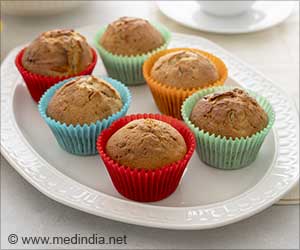- Corn flour becomes an unexpected hero in the fight against bad cholesterol
- Eating foods made with a blend of refined corn flour and corn bran for four weeks has been shown to lower LDL (low-density lipoprotein) cholesterol concentrations from 5% – 13.3%
- Almost 70% of the participants saw significant reductions in LDL cholesterol levels after consuming the blend of refined corn flour and corn bran
Want to flush out bad cholesterol? A blend of refined corn flour and corn bran can bring down your bad (LDL or low-density lipoprotein) cholesterol levels. Hurry up, it’s time to cornquer bad cholesterol.
The findings of the randomized crossover clinical trial, published in the Journal of Nutrition, suggest that consuming foods made from refined corn flour plus corn bran can lower LDL cholesterol levels by 5% (an average of 10 mg/dL) – 13.3% in four weeks (1✔ ✔Trusted Source
Evaluating the Effects of Corn Flour Product Consumption on Cardiometabolic Outcomes and the Gut Microbiota in Adults with Elevated Cholesterol: A Randomized Crossover
).
Advertisement
Corn Flour can Help you Say Goodbye to Bad Cholesterol
The trial focused on the cholesterol-lowering effect of three different types of corn flour: whole-grain corn meal, refined corn meal, and a blend of refined corn meal with added corn bran.
The 36 study participants were aged 18-67 and located in Phoenix, Arizona. They included a mix of women (~58%) and men, all joined the study with mild-to-moderately elevated LDL cholesterol levels, and none were taking cholesterol-lowering medications during the study.
Participants were asked to consume these flours daily for four weeks in the form of baked goods (muffins and pita bread).
Throughout the study, the participants individually underwent each food intervention for four weeks (with a minimum of a two-week washout period in between interventions to return to baseline) in order to assess the impacts of each intervention more precisely.
The results found that 70% of the participants saw a significant reduction in LDL cholesterol concentrations when consuming the blend. On the other hand, for the other corn flours, participants did not see a decrease or increase in their LDL or total cholesterol levels.
“People often think that dietary changes must be robust and significant to have a real impact on cardiovascular health and metabolic regulation,” said Corrie Whisner, Ph.D., lead researcher and Associate Professor in the College of Health Solutions at Arizona State University.
Advertisement
Corntastic Way to Gid Rid of High Cholesterol (Hypercholesterolemia)
Corn, also known as maize, is unique and often underappreciated. Hence, the art and science of refining grains and making the best use of corn bran may help develop healthful foods, based on this research, for better heart health. The researchers highlight that this corn flour blend offers a promising dietary strategy for managing high levels of cholesterol (hypercholesterolemia).
Dr. Whisner highlighted that the team deliberately centered the study on avoiding dramatic dietary changes to make a realistic intervention that could be easily folded into a regular diet. The researchers provided study participants with baked goods to control the type and quantity of corn flour. Simultaneously, the study participants did not increase or decrease their grain food intake during the study. These baked goods were developed by a master baker familiar with food formulation techniques and special ingredients used in foods commonly found in grocery stores. Their goal in this design was to ensure the study findings would explain how incorporating foods made with corn bran-enriched flour can be a part of a regular heart-healthy diet pattern.
This eye-opening research could be a simple and practical way to improve heart health through diet. Thus, swapping regular flour for a specific type of corn flour blend can be one of the best cholesterol-lowering ingredients.
Advertisement
What Makes Corn Flour Blend Healthy?
The fiber content in corn flour could be a game changer. Corn bran is rich in insoluble fiber, which plays a key role in digestive health and cholesterol management. By mixing refined corn meal with corn bran, researchers developed a special type of flour that is not only heart-healthy but also more delicious and palatable than whole-grain alternatives.
Surprisingly, the study also examined the effects of these corn flours on gut bacteria. However, the findings did not show significant or consistent changes in gut microbiota diversity. This aligns with the fact that study participants reported no digestive discomforts or any other changes during the interventions.
Two genera, unclassified Lachnospiraceae and Agathobaculum, differed significantly by treatment, and while an increase was seen in Agathobaculum (a common bacterium in the gut microbiota) during the whole-grain corn meal phase, that change was not seen in the other two phases.
The higher levels of polyphenols in whole-grain corn (which has the highest antioxidant capacity when compared to wheat, oats, and rice) could be the reason for the increase in Agathobaculum, but the study did not analyze this possibility, said Dr. Whisner.
“Nevertheless, while the influence of whole grains on the microbiota varies from person-to-person, some universals are generally known fibers in whole grains can be fermented by microbes into butyrate, and both fiber and butyrate are frequently associated with a healthy gut. These findings support that understanding.”
Hence, adding a blend of refined corn flour and corn bran into a daily diet may work wonders for people with high cholesterol (hypercholesterolemia) .
References:
- Evaluating the Effects of Corn Flour Product Consumption on Cardiometabolic Outcomes and the Gut Microbiota in Adults with Elevated Cholesterol: A Randomized Crossover – (https://www.sciencedirect.com/science/article/pii/S0022316624003420)
Source-Medindia



